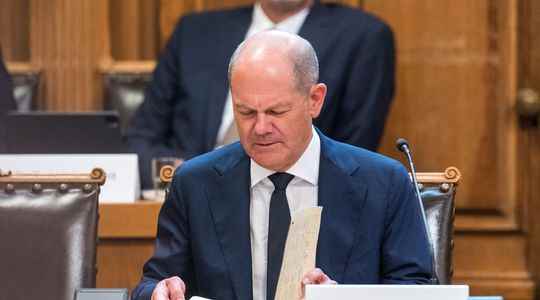He denied everything. Olaf Scholz passed on Friday, August 19, on the grill of the parliamentary commission of inquiry into the “Cum-ex Files” scandal, a tax fraud on dividends which splashes the German Chancellor. Explanations.
- “Cum-ex Files” scandal: a sprawling tax fraud
The so-called “Cum-ex Files” scandalrevealed in 2018, relates to an ingenious tax optimization system put in place by banks and allowing foreign investors to reduce their taxes on dividends.
Dozens of people have been charged in the case in Germany, including bankers, traders, lawyers and financial advisers. A total of ten countries are concerned. Among the incriminated banks is the Warburg in Hamburg, which should have reimbursed 47 million euros to the German port city, but the municipality had waived it in 2016. The bank finally had to pay tens of millions of euros in reimbursement under pressure from the government of Angela Merkel.
- What is accused of Olaf Scholz
The investigators are therefore trying to find out whether political leaders – and among them Olaf Scholz, then mayor of the city – pressured the municipal tax authorities to stop collecting these taxes. The decision to waive reimbursement of amounts owed by the Warburg bank was reportedly taken shortly after a conversation between Olaf Scholz and Christian Olearius, then head of the bank.
New elements revealed in recent days are undermining the defense of Angela Merkel’s successor. Several media have revealed in recent days that emails from someone close to Olaf Scholz had been seized by investigators and would provide “potentially conclusive” elements about “thoughts on the deletion of data”. This email “overwhelms” Olaf Scholz, summarizes the daily “Frankfurter Allgemeine Zeitung.”
At another elected SPD, likely to have played a role in the reimbursement by the bank, the investigators discovered more than 200,000 euros in cash in a safe, fueling suspicions about possible hidden financial arrangements.
Other documents seized would also suggest that Olaf Scholz, contrary to what he has said so far, would have raised the subject of reimbursement directly with Christian Olearius. The popular newspaper Picture in particular published extracts from the diary of Christian Olearius on Friday evoking a meeting between Olaf Scholz and him on October 26, 2016. “He asks questions, listens without expressing the slightest opinion and without indicating whether he intends to act or not”, would have written the banker after the meeting.
- What he answered before the commission of inquiry
Olaf Scholz answered questions from the Hamburg Parliament committee on Friday for more than three hours. His message, hammered home throughout the hearing? “I exercised no influence on the Warburg tax procedure”.
“There was no political influence on the tax procedure”, hammered Olaf Scholz, sweeping away “suppositions and insinuations” relayed according to him in the media.
Olaf Scholz denies lobbying tax officials in the city of Hamburg, which he ruled between 2011 and 2018.
- A hearing that falls badly for the government
The opposition rushed into the breach to criticize the leader of Europe’s leading economic power. “The latest revelations suggest that Olaf Scholz and his direct entourage have endeavored to give only limited information on certain meetings or telephone conversations (…) or to conceal them voluntarily in order to protect the current Chancellor”, denounces such as Matthias Hauer, conservative member of the Bundestag Finance Committee.
They fall badly for Olaf Scholz, who has become less popular than many of his ministers, less than a year after taking office. The ex-mayor of Hamburg is struggling to reassure the Germans, worried about possible energy shortages this winter, in particular of gas, in the context of the Russian invasion of Ukraine.
Gaffes also weaken the chancellor. On Tuesday, he did not react immediately to remarks by the head of the Palestinian Authority, Mahmoud Abbas, who compared in Berlin during a joint press conference the Israeli policy towards the Palestinians to the Jewish genocide by the Nazis. A lack of responsiveness that drew a volley of criticism.
